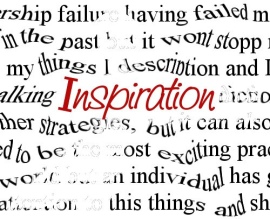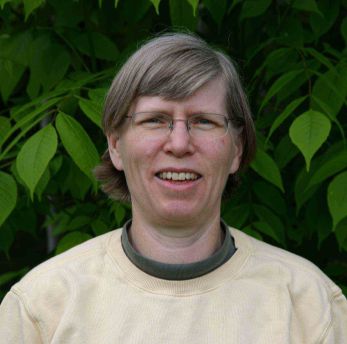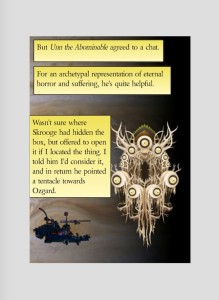
Creative commons: photosteve101, flickr
Lisa Trimpf, editor of the Eye to the Telescope submission call on sports and games gives some insight into what she’s looking fr.
Wanted: “Sports and Games”-Themed Speculative Poetry
Star Trek’s three-dimensional chess. Quidditch, in J.K. Rowling’s Harry Potter novels. The race to solve a gaming challenge in Ready Player One. Those are only a few examples of sports and games popping up in speculative literature, movies, and television—sometimes in a feature role, and sometimes as a side interest.
When the call went out for volunteer editor for Eye to the Telescope, the Science Fiction and Fantasy Poetry Association’s quarterly online magazine, I put up my hand. Tasked with suggesting a topic, I thought, why not sports and games? Having played a variety of sports throughout my lifetime, it’s an area of long-standing interest for me. Plus, the field is wide open for more speculation, more thought, more invention.
From where we’re standing in early 2019, it’s hard to predict with any certainty what the

Lisa Trimpf writes and plays sports.
future of sports and games might look like. We might guess wrong, and we might guess right. The reality might surprise us, because it’s something we didn’t foresee at all. I can attest to that from my experiences as a female athlete.
When I was growing up, there were no girls’ hockey teams in my home town, and as for playing on a boys’ team—at the time, it just wasn’t done. So my friends and I played pick-up ball hockey instead, or rented the local arena occasionally for a game of shinny. We wore the jerseys of our favorite NHL hockey stars, because those were our only role models.
 In the space of just under 40 years, so much has changed. Girls’ house league and rep teams abound in many areas of Canada. Women’s hockey is now in the Olympic Games—something that I would have found difficult to imagine in the late 1970s.
In the space of just under 40 years, so much has changed. Girls’ house league and rep teams abound in many areas of Canada. Women’s hockey is now in the Olympic Games—something that I would have found difficult to imagine in the late 1970s.
There have been, and continue to be, female role models young players can aspire to emulate, people like Hayley Wickenheiser, Marie-Philip Poulin, Cassie Campbell—and the list goes on. Women are now sports announcers and commentators. A handful of female hockey players have even been inducted into the Hockey Hall of Fame, something I can assure you my friends and I never saw coming back when we were shooting a tennis ball at a goal my friend’s father cobbled together from two-by-fours and plastic netting.
There are other trends, too, that many of us wouldn’t have imagined a few decades ago.  Fan participation in certain aspects of sport has broadened—all-star voting, for example, or fantasy leagues, in which fans get to pick their “dream team” and see how they perform. The Olympic Games now include events like aerial skiing or half-pipe snowboarding, sports that weren’t even a thing back when the modern Olympics were re-vitalized in 1896. And, of course, there are increasingly sophisticated sports-themed video games, a notion that seemed light years distant back in the 1970s when we thought Atari’s Pong was a big deal.
Fan participation in certain aspects of sport has broadened—all-star voting, for example, or fantasy leagues, in which fans get to pick their “dream team” and see how they perform. The Olympic Games now include events like aerial skiing or half-pipe snowboarding, sports that weren’t even a thing back when the modern Olympics were re-vitalized in 1896. And, of course, there are increasingly sophisticated sports-themed video games, a notion that seemed light years distant back in the 1970s when we thought Atari’s Pong was a big deal.
So, here we sit in 2019, almost 2020. What will sports and games look like four decades from now (or later) here on Earth? What new twists might we see on existing traditions? Will we eventually see gender parity in sports? Will parents of the future opt for genetic tweaking to produce the ultimate athlete? What sports and games will colonists bring with them to Mars, or the moon, or asteroid mining operations, or even further afield? What pastimes might aliens enjoy? Those are examples of ideas that might be explored or entertained in a speculative sports poem.
But the great thing about speculative poetry is that thinking about the future is only one avenue you might pursue. Speculative poetry opens so many other doors: magic and magical creatures, alternate histories, parallel universes, and so on.
Just one caveat: every editor has their own biases, and while I’m looking for good poems, I’m also looking for poems in which the link to the theme of sports and games is direct rather than oblique.
Some people like to participate in “theme-related” submission calls, while some do not. While everyone is entitled to their preference, I can say from my personal experience that themed submission calls such as the ones provided in Eye to the Telescope have spurred me to create works I might not have created otherwise.
In some cases, I’ve had success with submissions. In other cases, I’ve had submissions declined by the publication they were initially inspired by, but have later placed them elsewhere, making it worth the effort. Over the course of time I’ve learned not to look an inspirational gift horse in the mouth.
I’d encourage anyone with the inclination to do so to send in a poem or three Eye to the Telescope: Issue 32, Sports and Games. The complete guidelines can be found at the Eye to the Telescope web site.
So, why not give it a shot? Deadline is March 15, 2019, and all submitters should expect to receive an acceptance or decline by April 1, 2019.
Simcoe, Ontario resident Lisa Timpf first started writing speculative fiction and poetry in 2014 after retiring from a 26-year career in human resources and communications. She has had more than 30 speculative short stories and 70-plus speculative poems published. Timpf’s work has appeared in several magazines and anthologies, including Star*Line, New Myths, Neo-Opsis, Enter the Rebirth, and Tesseracts Twenty-One (Nevertheless). You can find out more about Timpf’s writing projects at http://lisatimpf.blogspot.com/.



 when I lied to the editor and said sure I had images of hummingbirds. How hard could it be to capture the little buggers on film, I figured. Several rolls of blank film later, and then a new 35mm SLR Canon with a zoom lens, I had the article, and the images. The economy of that enterprise put me at almost break even on the gig.
when I lied to the editor and said sure I had images of hummingbirds. How hard could it be to capture the little buggers on film, I figured. Several rolls of blank film later, and then a new 35mm SLR Canon with a zoom lens, I had the article, and the images. The economy of that enterprise put me at almost break even on the gig. I spent the next nine years perfecting a historical fantasy, Shadow Song, and tried to find a publisher for it. Had several near misses. It was cultural appropriation. It was genre-crossing. It was a square peg looking for a home in a world of round holes. Two agents tried to market the novel. And still no joy.
I spent the next nine years perfecting a historical fantasy, Shadow Song, and tried to find a publisher for it. Had several near misses. It was cultural appropriation. It was genre-crossing. It was a square peg looking for a home in a world of round holes. Two agents tried to market the novel. And still no joy. cultural fantasy, about two to dust off and polish my speculative fiction, Caliban, and then another five to complete a modern novel of magic realism called The Rose Guardian. That novel releases September 1, 2019. It’s probably the best thing I’ve ever written, and also the hardest. And after this I probably will seldom speak of it and instead turn people to the next novel by Michael Skeet, or the two posthumously published novels by Dave Duncan, or any of the audiobooks being released next year. Or even Tesseracts 22: Alchemy and Artifacts, which I’ve edited with Susan MacGregor, and also releases next year.
cultural fantasy, about two to dust off and polish my speculative fiction, Caliban, and then another five to complete a modern novel of magic realism called The Rose Guardian. That novel releases September 1, 2019. It’s probably the best thing I’ve ever written, and also the hardest. And after this I probably will seldom speak of it and instead turn people to the next novel by Michael Skeet, or the two posthumously published novels by Dave Duncan, or any of the audiobooks being released next year. Or even Tesseracts 22: Alchemy and Artifacts, which I’ve edited with Susan MacGregor, and also releases next year. Podcast? my brain said in its nervous Peter Parker like voice. I don’t do a podcast. Never thought to do a podcast. My inner Parker disappeared as genuine curiosity took over my process. Could I do a podcast? I had no idea. But as I’ve stated on my podcast, I never let not knowing what I’m doing stop me. So I did some research and went about the business of acquiring interviews.
Podcast? my brain said in its nervous Peter Parker like voice. I don’t do a podcast. Never thought to do a podcast. My inner Parker disappeared as genuine curiosity took over my process. Could I do a podcast? I had no idea. But as I’ve stated on my podcast, I never let not knowing what I’m doing stop me. So I did some research and went about the business of acquiring interviews.

